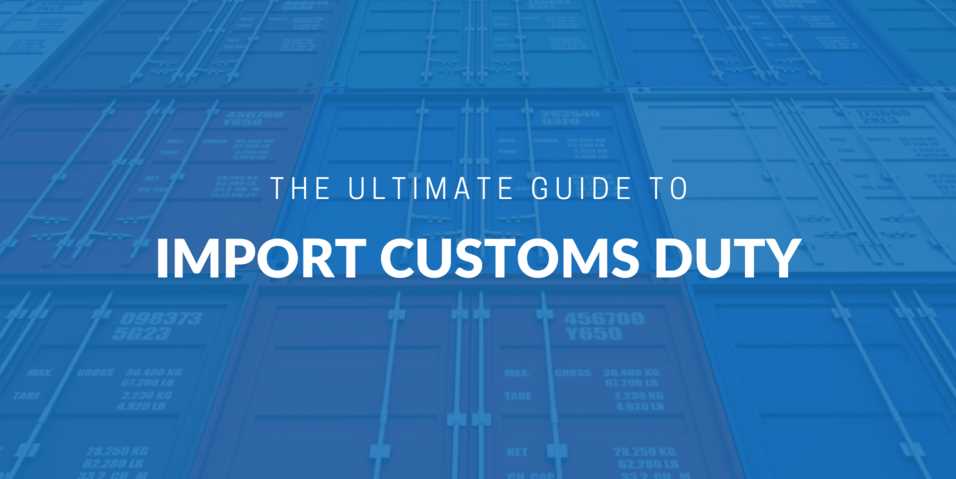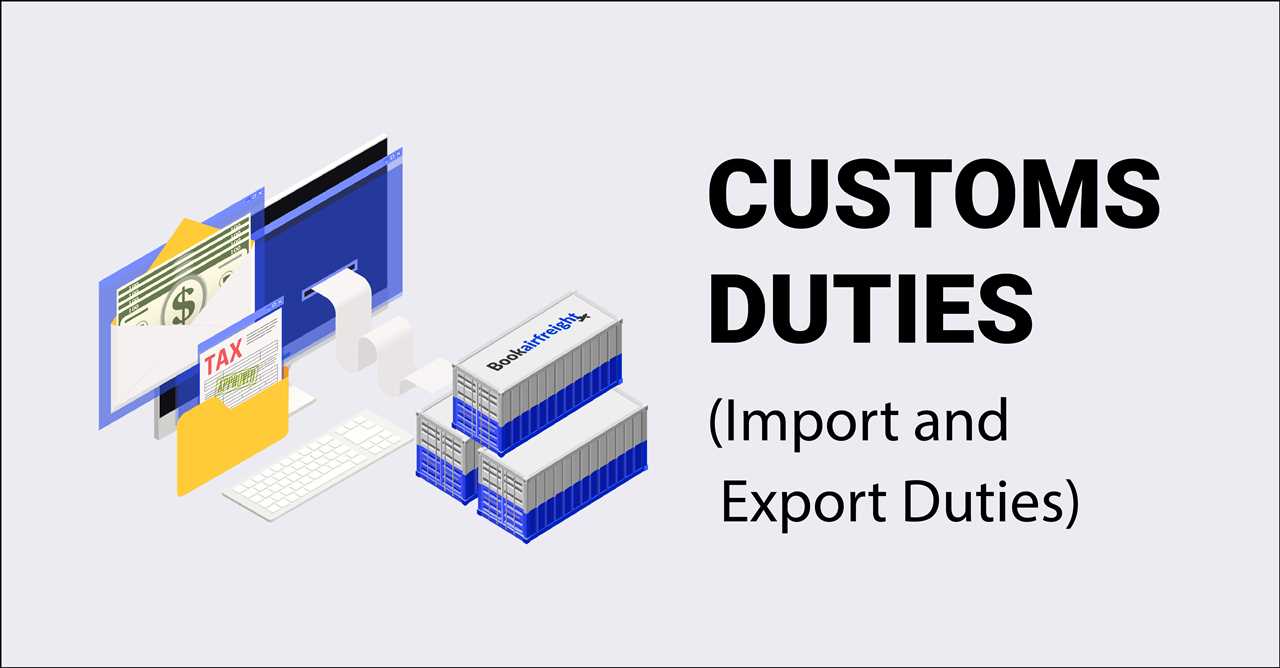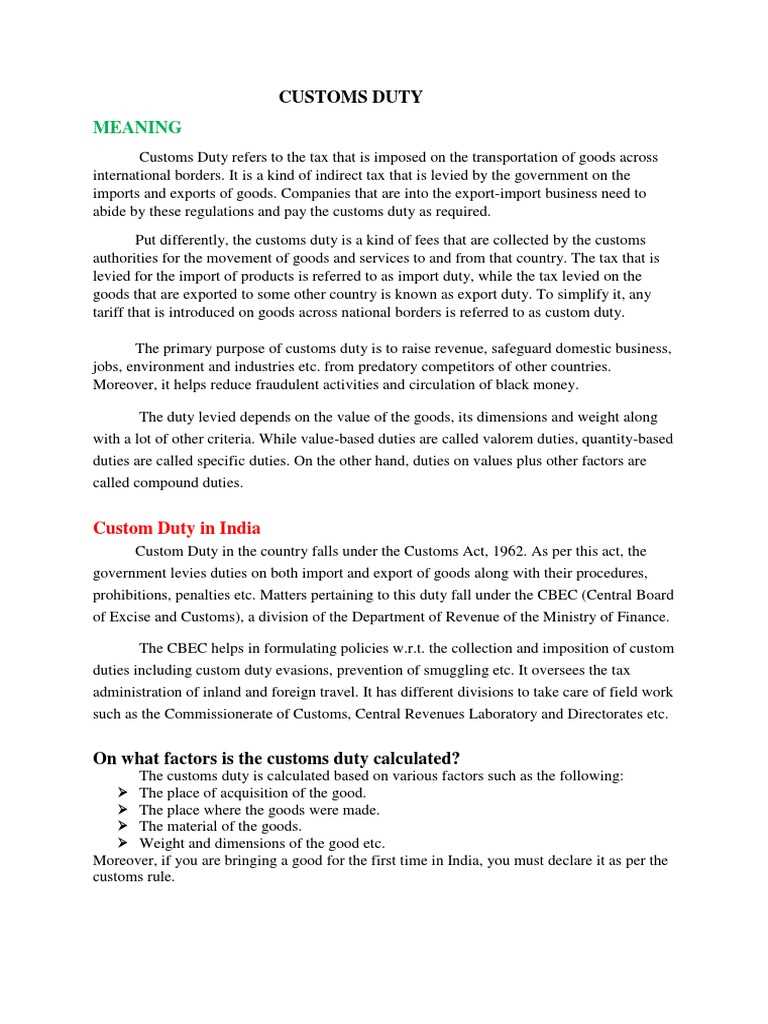Import Duty: Definition, How It Works, and Who Pays
Definition of Import Duty
Import duty is a tariff or tax imposed on goods when they cross the international border of a country. It is a form of indirect tax that is paid by the importer of the goods. The rate of import duty varies depending on the type of goods and the country of origin.
How Import Duty Works
When goods are imported into a country, they go through customs clearance, where the customs authorities assess the value of the goods and determine the applicable import duty rate. The import duty is calculated based on the customs value of the goods, which includes the cost of the goods, insurance, and freight charges.
Import duty can be ad valorem, which is a percentage of the customs value, or specific, which is a fixed amount per unit of the imported goods. Some countries also impose additional taxes, such as value-added tax (VAT) or excise duty, on top of the import duty.
Who Pays Import Duty

The importer of the goods is responsible for paying the import duty. The importer can be an individual or a business entity. In some cases, the exporter may also be responsible for paying the import duty, depending on the terms of the trade agreement or contract.
Import duty is typically collected by the customs authorities at the point of entry, such as ports, airports, or border checkpoints. Failure to pay the import duty may result in penalties, such as fines or seizure of the goods.
Overall, import duty plays a crucial role in regulating international trade and protecting domestic industries. It helps to create a level playing field for domestic producers and ensures that imported goods are not sold at unfairly low prices, which could harm local businesses.
What is Import Duty?
The purpose of import duty is twofold. Firstly, it serves as a source of revenue for the government, contributing to the country’s budget. Secondly, it acts as a trade barrier, making imported goods more expensive and less competitive compared to domestically produced goods.
Import duty can have both positive and negative effects on the economy. On one hand, it can protect domestic industries from foreign competition, allowing them to grow and create jobs. On the other hand, it can increase the cost of imported goods for consumers, leading to higher prices and potentially reducing consumer choice.
Import duty is often a contentious issue in international trade negotiations. Countries may impose higher duties on certain goods to protect their domestic industries, which can lead to trade disputes and retaliatory measures from other countries.
How Does Import Duty Work?
The purpose of import duty is to protect domestic industries and regulate international trade. By imposing import duties, governments can make imported goods more expensive compared to domestically produced goods, thereby encouraging consumers to buy local products. Import duties can also be used as a source of revenue for the government.
Calculation of Import Duty

The rate of import duty is usually expressed as a percentage of the customs value. For example, if the customs value of a product is $1,000 and the import duty rate is 10%, the import duty payable would be $100. It is important to note that different goods may have different duty rates, and some goods may be exempt from import duty altogether.
Paying Import Duty
The responsibility for paying import duty lies with the importer, who is the person or business bringing the goods into the country. The importer is usually required to declare the goods to customs authorities and provide the necessary documentation, including invoices and shipping documents. Customs authorities will then assess the import duty based on the customs value and the applicable duty rate.
Import duty can be paid at the time of importation or deferred to a later date, depending on the customs regulations of the country. In some cases, import duty may be paid by the exporter or included in the price of the goods, but ultimately it is the responsibility of the importer to ensure that the duty is paid.
Failure to pay import duty or attempting to evade import duty can result in penalties, such as fines or seizure of the goods. It is important for importers to understand the import duty regulations of the country they are importing into and comply with the requirements to avoid any legal issues.
Who Pays Import Duty?
The responsibility of paying import duty falls on the importer, who is usually the buyer of the goods. The importer is required to pay the import duty before the goods are released from customs and allowed into the country. Failure to pay the import duty can result in the goods being held by customs or even confiscated.
In some cases, the importer may choose to pass on the cost of import duty to the consumer by increasing the price of the imported goods. This means that the consumer ultimately pays the import duty indirectly. However, the decision to pass on the cost of import duty to the consumer depends on various factors, such as market conditions, competition, and the elasticity of demand for the imported goods.
It is important to note that import duty is not always paid by the importer. In certain situations, the exporter or the seller of the goods may agree to bear the cost of import duty as part of the sales agreement. This is more common in international trade negotiations, where the exporter may offer to pay the import duty in order to make the goods more competitive in the importing country.
In summary, import duty is typically paid by the importer or the buyer of the imported goods. However, the decision to pass on the cost of import duty to the consumer or to negotiate the payment of import duty with the exporter depends on various factors and can vary in different trade agreements.
ECONOMICS catname

Import duty is levied on a wide range of goods, including raw materials, finished products, and consumer goods. The rate of import duty varies depending on the type of goods and the country of origin. It is usually calculated as a percentage of the value of the imported goods.
The purpose of import duty is to make imported goods more expensive compared to domestically produced goods, thereby encouraging consumers to buy locally produced goods. This helps to protect domestic industries from foreign competition and promote economic growth.
Import duty is collected by customs authorities at the point of entry into the country. The responsibility for paying import duty lies with the importer, who is usually the buyer of the goods. The importer is required to declare the value of the goods and pay the applicable import duty to the customs authorities.
Import duty can have both positive and negative effects on the economy. On the one hand, it can protect domestic industries and create jobs. On the other hand, it can increase the cost of imported goods, leading to higher prices for consumers and potentially reducing consumer choice.
| Pros | Cons |
|---|---|
| Protects domestic industries | Increases cost of imported goods |
| Generates revenue for the government | Potentially reduces consumer choice |
| Promotes economic growth |

Emily Bibb simplifies finance through bestselling books and articles, bridging complex concepts for everyday understanding. Engaging audiences via social media, she shares insights for financial success. Active in seminars and philanthropy, Bibb aims to create a more financially informed society, driven by her passion for empowering others.
